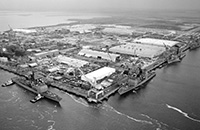Ingalls Shipbuilding
Ingalls Shipbuilding was established in 1938 in the Gulf town of Pascagoula, Mississippi, to meet the U.S. demand for Navy vessels that were used during World War II. Production was so intense during the early 1940s, in fact, that men from all parts of Mississippi and western Tennessee came to Pascagoula looking for work at the shipyard.

Written by Aaron Munz • Edited By Walter Pacheco
Asbestos.com is the nation’s most trusted mesothelioma resource
The Mesothelioma Center at Asbestos.com has provided patients and their loved ones the most updated and reliable information on mesothelioma and asbestos exposure since 2006.
Our team of Patient Advocates includes a medical doctor, a registered nurse, health services administrators, veterans, VA-accredited Claims Agents, an oncology patient navigator and hospice care expert. Their combined expertise means we help any mesothelioma patient or loved one through every step of their cancer journey.
More than 30 contributors, including mesothelioma doctors, survivors, health care professionals and other experts, have peer-reviewed our website and written unique research-driven articles to ensure you get the highest-quality medical and health information.
About The Mesothelioma Center at Asbestos.com
- Assisting mesothelioma patients and their loved ones since 2006.
- Helps more than 50% of mesothelioma patients diagnosed annually in the U.S.
- A+ rating from the Better Business Bureau.
- 5-star reviewed mesothelioma and support organization.
Testimonials
My family has only the highest compliment for the assistance and support that we received from The Mesothelioma Center. This is a staff of compassionate and knowledgeable individuals who respect what your family is experiencing and who go the extra mile to make an unfortunate diagnosis less stressful. Information and assistance were provided by The Mesothelioma Center at no cost to our family.LashawnMesothelioma patient’s daughter
How to Cite Asbestos.com’s Article
APA
Munz, A. (2023, June 20). Ingalls Shipbuilding. Asbestos.com. Retrieved April 19, 2024, from https://www.asbestos.com/shipyards/ingalls-shipbuilding/
MLA
Munz, Aaron. "Ingalls Shipbuilding." Asbestos.com, 20 Jun 2023, https://www.asbestos.com/shipyards/ingalls-shipbuilding/.
Chicago
Munz, Aaron. "Ingalls Shipbuilding." Asbestos.com. Last modified June 20, 2023. https://www.asbestos.com/shipyards/ingalls-shipbuilding/.
Even after World War II, the shipyard continued construction of naval combat ships, and in 1957 the company received a contract from the U.S. Navy to build 12 nuclear-powered attack submarines. It was later proved that by then Ingalls had exposed workers to asbestos as part of their jobs, and the shipyard became a key player in Mississippi’s asbestos litigation history.
In 2021, the International Journal of Environmental Health Research published a review of medical literature on the risk of asbestos-related cancer among sailors. It included a 2020 study showing seafarers from five Nordic countries have more than double the risk of developing mesothelioma compared to the general public.
According to a 2017 report published in Archives of Environmental & Occupational Health, shipyard workers exposed to a moderate amount of asbestos are nearly four times more likely to die of mesothelioma. Workers at Ingalls were at risk of exposure to moderate and high levels of asbestos.
Asbestos Exposure
Ingalls was a major employer in southern Mississippi, and many workers at the shipyard developed asbestos-related diseases like mesothelioma. By 1991, slightly more than five decades into the shipyard’s existence, more than 3,100 former workers had filed lawsuits against the company related to asbestos exposure. More than 90 percent of them claimed they were occupationally exposed.
Many of the claimants did not show symptoms of asbestos-related diseases at the time, but chest X-rays indicated benign changes within the lung that could result in malignancies in the future. Many of the former workers made a “protective filing” to prevent the statute of limitations from running out, making it possible to seek later compensation.
Jefferson Yates worked as a shipfitter between 1953 and 1967 and in 1981 was diagnosed with asbestosis, chronic bronchitis and possible malignancy in his lungs. Less than a month later, he filed a claim for disability benefits saying that his medical problems resulted from his occupational exposure to asbestos. Ingalls admitted its liability and entered into a settlement with Yates.

Overly, et al v. Ingalls Shipbuilding
Eventually, Ingalls’s acknowledgement of asbestos exposure helped make the company and its shipyard a centerpiece of asbestos legislation. The shipyard had the misfortune of being based in Mississippi, a state that smiled on mass torts in the 1970s and beyond. The company was the target of a number of claims by workers and former workers who claimed they were exposed to asbestos while on the job, and that the exposure gave them mesothelioma and other asbestos-triggered diseases.
One case that looms large related is Robert H. Overly, et al, v. Ingalls Shipbuilding. The jury awarded Robert Overly $465,000 in economic damages and $400,000 in non-economic damages.
Overly worked for Westinghouse as a field service engineer supervising the installation of turbines, generators and other equipment manufactured by Westinghouse. From 1960 to 1964, he worked out of Westinghouse’s South Philadelphia plant and spent about 25 percent of the time in the field. He visited Ingalls shipyard to service ships several times during that period. Working out of Westinghouse’s Sunnyvale, California, office from 1964-67, Overly made two trips to the Ingalls, spending two to three days working on ships. He also made at least one trip to the shipyard in the mid-1970s. In 1996, Overly was diagnosed with mesothelioma.
The original verdict in the Overly lawsuit found co-defendants Ingalls and Avondale shipyards guilty of negligence. Ingalls was assigned 4 percent of the fault, with 10 percent assigned to Avondale, 50 percent to Westinghouse and 36 percent to “all others.” Although the settlement amount was later reduced, Ingalls kept its 4 percent liability.
Ingalls is also tied indirectly to a record $322 million verdict for an asbestos plaintiff in Mississippi. Smith County Circuit Judge Eddie Brown, while presiding over the trial, mentioned that his father was part of an asbestos claim against the shipyard, where his father had worked.







